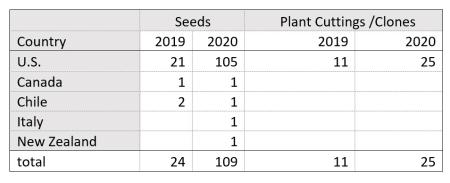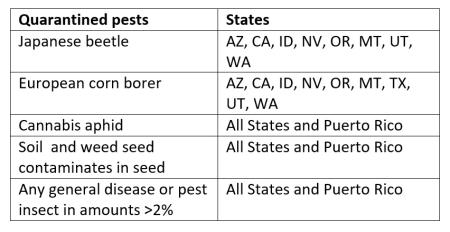FOR IMMEDIATE RELEASE
April 21, 2020
Contact: Mary Peck, 720-428-0441, mary.peck@state.co.us
Broomfield, Colo. - Colorado’s industrial hemp plant and seed industry exports continue to grow exponentially, having expanded tenfold in the last year (see table below). As farmers begin spring planting, managing the quality of the seed and clones/transplants planned for export is paramount.
Colorado Hemp Seed and Clone Export Totals (January-March)
The Colorado Department of Agriculture’s (CDA) Phytosanitary, Seed and Nursery programs facilitate export of hemp seeds and clones/transplants across the U.S. and the world and offer important protections for farmers. These regulatory programs mandate truthful labeling and freedom from pests and diseases.
Whenever hemp plants and seed leave the state of Colorado, it’s important to research each state or country’s ‘pests and diseases’ of concern. If one of those listed pests or diseases occurs in Colorado, another country or state will issue a quarantine restricting the movement of plant material. To facilitate movement of plants, CDA inspects the material and issues a phytosanitary certificate stating freedom of specific quarantine pests to meet the restriction.
U.S. Pest Quarantines
CDA is currently monitoring three pests occurring in Colorado that are causing concern for other states: Cannabis aphid, European corn borer, and Japanese beetle. The European corn borer (ECB), a pest of grain and a wide variety of plants, was recently added to several state’s hemp quarantines.
Originally native to Europe, ECB was introduced to North America in the early 1900s and has spread westward to the Rocky Mountains. ECB is present in Eastern Colorado and along the Front Range. Several states west of the Rocky Mountains have quarantines against this insect, which has an affinity for hemp. Because of growing concern about ECB, extra care must be taken to keep the pest from moving from eastern Colorado to the Western Slope and to other states.
Shipping plant material, seeds and clones/transplants with proper inspection and phytosanitary certificates helps ensure the shipment will arrive successfully at its destination, and upholds the quality and reputation of Colorado’s industrial help industry. For more information about dried hemp flower shipments, and other pests, please contact CDA’s Phytosanitary Program at phyto@state.co.us.
The Colorado Department of Agriculture exists to support the state's agriculture industry and serve the people of Colorado through regulation, advocacy and education. Our mission is to strengthen and advance Colorado agriculture, promote a safe and high-quality food supply, protect consumers, and foster responsible stewardship of the environment and natural resources.

